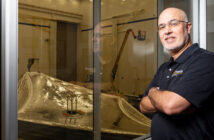Before I came to college, I never thought about how to make a friend.
That isn’t to say I didn’t enjoy socializing or that I was extremely introverted growing up, but all of the important relationships in my life formed as a result of other people’s influence.
My high school English teacher enforced a strict alphabetical seating chart making it easier for me to befriend someone with a last name that began with the letter “K” rather than the letter “A.”
My parents bought their first home on the street around the corner from my grandparents. The three-minute drive allowed us to have family dinners frequently.
For the overwhelming majority of the past 20 years, I was placed in situations that made “proximity” nearly synonymous to “connection.”
It might seem evident that my kindergarten hallway buddy became my childhood best friend or that my go-to activity after school was playing tag with my next door neighbors. Yet, it wasn’t until I took a social psychology course at Lehigh that I could answer the question: Why are my close friends, my close friends?
The term for this phenomenon is called the “proximity principle:” The closer you are to another person physically, the more likely you are to form a relationship with them. It goes hand in hand with the mere-exposure effect, saying that we develop preferences for things that are familiar to us.
As a child, I was thrown into environments, such as soccer practice or summer camp, where I spent time with the same people. Inevitably, they became my network of friends. My proximity circles were dependent on the directions my parents, teachers or sports coaches encouraged me to follow.
When I entered college last year as a freshman and learned about these two terms, I immediately looked around to see who was in my Lehigh proximity circle.
I lived in close quarters with my hallmates and I saw the students in my orientation group on Zoom for a few hours a day for one week. In total, I was exposed to less than 30 people. In a university of over 5,000 undergraduate students, a limited 30-person pool of potential friends didn’t seem to work in my favor.
At first, I thought class might be a better way to connect with those around me. But, what nobody told me about college is that there aren’t as many partner activities or group discussions, at least in the classes I’ve taken.
Most professors use class time to lecture, and to lecture only.
It became clear to me that if I wanted to make friends beyond my roommate, it was my responsibility to expand my proximity circle. I had to create circumstances that would place me near people in a physical sense, since nobody was going to do it for me.
So, I decided to lean in.
I joined The Brown and White to see if spending time with students that shared an interest in writing could initiate a relationship or two. I ended up applying to be an editor and now I am going on my third semester.
I leaned into Greek Life and into the Office of First-Year Experience as a soon-to-be orientation leader.
The clubs I joined and the organizations I chose to be a part of are reflective of my values and personal interests. If others decided to sign up with the same intentions, I figured that the science behind friend-making could pay off.
Throughout my experience, I’ve learned that the proximity effect doesn’t require you to be the biggest social butterfly or the friendliest person in the room to create a memorable connection with someone.
The proximity effect will work if you just show up. Go to the club meeting or the event and take a seat next to someone — see what happens.
Day one on campus, I was told by many people to “get involved.”
From my experience, there is truth behind this cliché phrase that most first-year students typically roll their eyes at.
Physical closeness does translate to connectedness. Without that knowledge, I know I would have missed out on meeting many of the amazing people who are now in my Lehigh proximity circle.






Comment policy
Comments posted to The Brown and White website are reviewed by a moderator before being approved. Incendiary speech or harassing language, including comments targeted at individuals, may be deemed unacceptable and not published. Spam and other soliciting will also be declined.
The Brown and White also reserves the right to not publish entirely anonymous comments.